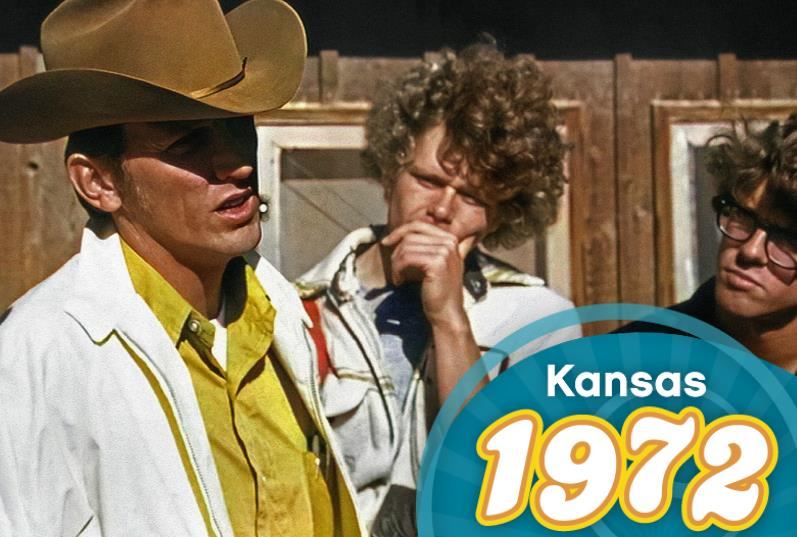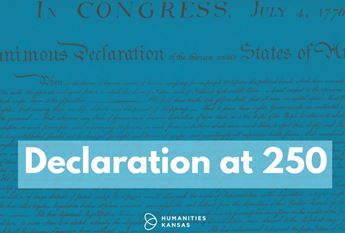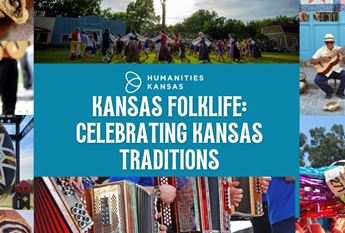

Kansas 1972: Think Globally, Act Locally
April 22, 2022
In 1972, the same year Humanities Kansas was founded, Congress passed the Clean Water Act, the United Nations held its first Conference on the Human Environment, the Club of Rome published “The Limits to Growth,” and the Keep America Beautiful campaign tried to persuade people to stop throwing trash pretty much everywhere but waste-cans.
The era of the late 1960s and early 1970s is really when environmental issues become important concerns for many Americans. When the first Earth Day was celebrated in 1970, tens of thousands of individuals across the country engaged in community clean up projects, and listened to speakers extol the importance of environmental conservation.
And Kansans were part of this larger awakening. In the early 1970s, the Kansas Committee for the Humanities (now Humanities Kansas) issued a number of grants to Kansas Communities that facilitated discussions on issues like the effects of industrialization on air and water quality, land use concerns, and how environmental problems would affect Kansans’ quality of life.
In Episode 4, we’ll hear Kansas stories from this era of environmental issues entering the public consciousness, including plans by the US government to put a nuclear waste disposal site in Kansas and how the integration of art and science helped bring public attention to the prairie.
Go Deeper
Archival Audio Sources
- Janis Ian. Friends Of The Earth PSA, 1973
- US Dept. of Energy, Endless Chain, 1972
- President Dwight D. Eisenhower, Atoms for Peace speech, December 8th, 1953
- The Nuclear Look, promotional film by Westinghouse, 1979
- ABC news report, Feb. 17, 1971
- NBC news report, Sept. 27, 1971
- CBS news report, March 21, 1971
-
Survival on the Prairie, NBC, 1970
-
Newsweek interview with Patricia Duncan, May 26,1985
Primary Sources
- The Wichita Eagle, Dec. 31st, 1972
- The Hutchinson News, October 18th, 1971
- Garden City Telegram, January 20th, 1972
- Garden City Telegram, Feb. 7th, 1972
-
Patricia Duncan, “The Tallgrass Prairie: An American Landscape” digitized SITES exhibit
-
Patricia Duncan, “Tallgrass Prairie: The Inland Sea,” 1978, on Google Books
-
Patricia Duncan, “Red Prairie with Bison,” acrylic on canvas, 1990
-
The Wichita Eagle, April 28th, 1972
-
The Wichita Beacon, July 8th, 1973
-
The Iola Register, October 1st, 1973
-
The Parsons Sun, August 30th, 1973
Secondary Sources
- J. Samuel Walker, “The Road to Yucca Mountain: The Development of Radioactive Waste Policy in the United States,” 2009, on Google Books
- Science Magazine, “Kansans Riles by AEC Plans for Atomic Dump,” April 16, 1971.
- AEC Environmental Statement, “Radioactive Waste Repository, Lyons, Kansas,” Bulletin of the Atomic Scientists, 27:6, 1971, pp. 33-34.
- To learn more about nuclear waste storage methods today, see: Storage Of Spent Nuclear Fuel | NRC.gov
- To learn more about the Yucca Mountain site, see: Backgrounder On Licensing Yucca Mountain | NRC.gov
-
“Tallgrass Prairie National Preserve Legislative History, 1920-1996, ” National Park Service online book
-
For a fuller story of how the Tallgrass Prairie Preserve came into being, see the Humanities Kansas-funded documentary by Dave Kendall, “Tallgrass Prairie National Preserve: A Flint Hills Love Story." Watch on Vimeo
Interviews
- Tom Wellock, historian at the Nuclear Regulatory Commission
- Herb Duncan, architect and husband of Patricia Duncan
- Linda Duke, Director of the Marianna Kistler Beach Museum of Art at Kansas State University
Music for whole episode: Clelia Walking



